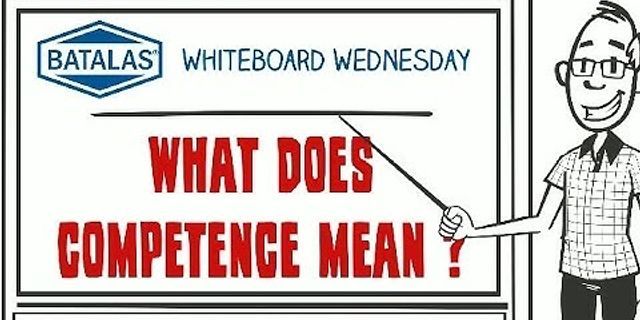This article will help better understand cultural competence and its components. Adopted cross-cultural attitude strategies will help to develop and enhance the ability to practice effective communication in intercultural situations. Show
Working and living in a global society requires the ability to create interactions and relationships with people who are different from oneself. It is critical to know how to assess our cultural competency and evaluate our own cultural behaviors. Globalization and diversity lowered the barriers that once separated cultures both internationally and domestically (Garneau & Pepin, 2015). Cultural competency skills can help businesses run more productively, and efficiently. Practicing cultural competency skills can also elevate your customer service skills. Exceptional customer service gives you the ability to set your business apart from your competitors and keeps your customers returning to your business. What is culture?In 1951, Kluckhohn explained culture as sharing a pattern of thinking, feeling, reacting, and problem-solving. Culture is a dynamic relational process of shared meanings that originate in the interactions between individuals (Carpenter-Song, Schwallie, & Longhofer, 2007). In 2010, Gregory and colleagues emphasized that culture must be considered in historical, social, political, and economic contexts. Betancourt (2004) defined culture as a pattern of learned beliefs, values, and behavior that are shared within a group; it includes language, styles of communication, practices, customs, and views on roles and relationships. Edgar Schein (2010) described a culture as "shared beliefs, values, and assumptions of a group of people who learn from one another and teach to others that their behaviors, attitudes, and perspectives are the correct ways to think, act, and feel." Psychologists argue that unfamiliar culture negatively affects an individual's sensemaking mechanisms and determine their behavioral responses. As a result, individuals cannot accurately perceive, interpret, explain, and predict the behavior of people with different cultural background(s) (Muzychenko, 2008). What is cultural intelligence?Cultural intelligence is the ability to interpret the stranger's behavior the way the stranger's compatriots would (Muzychenko 2008). For example, if employees don't feel as if their manager understands or respects their culture, employees may find it hard to trust the leader or work as a team. What is cultural competence?Current research on cultural competence focuses on sensitivity to cross-cultural differences and the ability to adapt to other cultural environments (e.g., Hansen, Pepitone-Arreola-Rockwell, & Greene, 2000), or reflective awareness of cultural influences on one's thoughts and behaviors (Chao, Okazaki, & Hong, 2011). Muzychenko (2008) defined cultural competence as the appropriateness and effectiveness of one's behavior in an alien cultural environment. Wilson, Ward, and Fischer (2013) defined cultural competence as "the acquisition and maintenance of culture-specific skills" for very practical reasons:
Williams (2001) defined cultural competence as "the ability of individuals and systems to work or respond effectively across cultures in a way that acknowledges and respects the culture of the person or organization being served" p.1. Why do we need to develop cultural competence?Developing cultural competence helps us understand, communicate with, and effectively interact with people across cultures. It gives us the ability to compare different cultures with our own and better understand the differences. Unconsciously, we bring our own cultural frame of interpretation to any situation. This is not to say that culture alone determines how one interprets a situation. One's own unique history and personality also play an important role (Hofstede, 2002). How do we develop an attitude and components of cultural competence?Developing cross-cultural attitudes allows one to develop skills for better engaging with people from all kinds of cultures. Cross-cultural skills demonstrated through the ability to communicate with respect; recognize others' values, accept knowledge, skills, and talents; and tolerate, engage, and celebrate the success of others. Deardorff defined competence as "the ability to communicate effectively and appropriately in intercultural situations based on one's intercultural knowledge, skills, and attitudes" (Deardorff, 2006, pp. 247-248). We adopted Deardorff (2006) cross-cultural attitude strategies that help you to develop and enhance one's ability to practice effective communication in intercultural situations:
Borchum (2002) described cultural competence as "a non-linear dynamic process that is never-ending and ever expending. It is built on increases in knowledge and skill development related to its attributes" p. 5. We synthesized and adopted Williams's (2001) and Martin and Vaughn's (2007) studies that can assist in better understanding of components of cultural competency. These attributes will guide you in developing cultural competence:
In conclusion, our global society necessitates interactions and relationships with people who are different from oneself. By developing one's own cultural competence, productivity and efficiency may increase and in turn improve one's customer service skills. Customers who feel valued and understood will return for repeat business. ResourcesBurchum, J. L. R. (2002, October). Cultural competence: An evolutionary perspective. In: Nursing Forum: (Vol. 37, No. 4, p. 5). Blackwell Publishing Ltd. Carpenter-Song, E. A., Schwallie, M. N., & Longhofer, J. (2007). Cultural competence reexamined: critique and directions for the future. Psychiatric Services, 58(10), 1362-1365. Betancourt, J. R. (2004). Cultural competence—marginal or mainstream movement? New England Journal of Medicine, 351(10), 953-955. Chiu, C.-Y., Lonner, W. J., Matsumoto, D., & Ward, C. (2013). Cross-Cultural Competence: Theory, Research, and Application. Journal of Cross-Cultural Psychology, 44(6), 843–848. Garneau, A. B., & Pepin, J. (2015). Cultural competence: A constructivist definition. Journal of Transcultural Nursing, 26(1), 9-15. Gregory, D., Harrowing, J., Lee, B., Doolittle, L., & O'Sullivan, P. S. (2010). Pedagogy as influencing nursing students' essentialized understanding of culture. International Journal of Nursing Education Scholarship, 7(1), 30. doi:10.2202/1548-923X.2025 Hofstede, G. J., Hofstede, G., & Pedersen, P. B. (2012). Exploring culture: exercises, stories, and synthetic cultures. Boston: Intercultural Press. Hofstede, G. J., Pedersen, P. B., & Hofstede, G. (2002). Exploring culture: Exercises, stories, and synthetic cultures. Nicholas Brealey. Martin, M., & Vaughn, B. (2007). Cultural competence: The nuts and bolts of diversity and inclusion. Strategic Diversity & Inclusion Management, 1(1), 31-38. Muzychenko, O. (2008). Cross-cultural entrepreneurial competence in identifying international business opportunities. European Management Journal, 26(6), 366-377. Schein, E. H. (2010). Organizational culture and leadership (Vol. 2). John Wiley & Sons. Williams, B. (2001). Accomplishing cross cultural competence in youth development programs. Journal of Extension, 39(6), 1-6. Wilson, J., Ward, C., & Fischer, R. (2013). Beyond culture learning theory: What can personality tell us about cultural competence? Journal of cross-cultural psychology, 44(6), 900-927. What knowledge or skills might you have to develop in order to be culturally competent?Self-knowledge and awareness about one's own culture. Awareness of one's own cultural worldview. Experience and knowledge of different cultural practices. Attitude toward cultural differences.
What are the skills and knowledge required to be multi culturally literate?Cross Cultural Communication -- Verbal and nonverbal communication skills in interaction with those who are culturally different from one's self. Teamwork -- The ability to work in culturally diverse groups toward a common goal. Listening -- The intention and ability to attend to what others are saying.
What cultural competency skills do the professionals need to be effective?Cultural Competency Skills You Should Develop. Active and unbiased listening skills.. Respect of others' points-of-view.. Encouragement of expression of diverse opinions and perspectives.. What skills would you need to support a diverse group?Top 5 diversity skills you must have in 2021. Be an advocate and an upstander. ... . Be a tireless student. ... . Fight unconscious bias, stereotypes and microaggressions. ... . Create inclusive messaging internally and externally. ... . Cultivating cultural awareness and multicultural understanding.. |

















